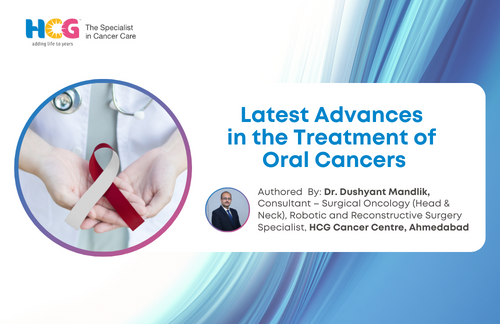July 11, 2022
Dr. Dushyant Mandlik, Consultant - Surgical Oncology (Head & Neck, Robotic and Reconstructive Surgery Specialist), HCG Cancer Centre, Ahmedabad.

Oral cancer is the sixth most prominent type of cancer worldwide, with India accounting for about a third of the total burden. It is also the second country to have the largest number of oral cancer cases.
As we learn about its prevalence, it is also important for us to understand the risk factors that are associated with its incidence. Some of the main risk factors associated with oral cancers are tobacco consumption, HPV infection, bad oral hygiene, dental trauma, etc.
Thanks to the constant research that is happening in the field of head and neck oncology, we are learning something new about oral cancer every day – be it on how to prevent it, how to detect it in its early stages, or how to treat it in a better way. Unlike before, today, we are able to dive into much deeper levels of understanding of how oral cancer occurs. This higher level of understanding plays a pivotal role in treating any oral cancer case with the right treatment, the first time.
At HCG, patients can consult the best oral cancer specialists in Ahmedabad, who have vast experience in devising and administering value-based and patient-centric treatment and care.
Latest Advances in the Treatment of Oral Cancers
Back then, oral cancer treatment was not as advanced as it is today. Preserving the structure and function during the treatment was a big challenge. Post-surgery adjuvant treatment in form of radiation therapy and chemotherapy came with inevitable damage to the healthy tissue as they were not as precise as they are today. However, this is no longer the case. We have some highly advanced treatment approaches for oral cancers, which not only preserve the structure and function of the organ but also preserve the quality of life in patients.
Minimal Access Surgery (MAARSH)
Minimal access surgery was not an option for head and neck cancers until a few years ago, and traditional surgeries, which involved large excisions, came with drawbacks like visible scars, a lengthy recovery, breathing/swallowing difficulties, etc. However, Minimal Access Adequate Resection Surgery for Head & Neck Cancer (MAARSH), also known as minimal access surgery, addresses these drawbacks.
Since minimal access surgeries involve smaller to no incisions, the recovery time and the risk of treatment-related complications are reduced significantly. There is minimal scarring, and patients hardly experience breathing/ swallowing difficulties. These surgeries also help patients return to their normal activities at a faster rate.
Organ Preservation
As the name says, organ preservation in oral cancer treatment refers to treating the tumour without having to remove the entire organ. Organ preservation surgeries play a significant role in preserving the quality of life in oral cancer patients. Preservation of functioning tongue and jawbone matters a lot.
Advanced Reconstruction
Back in the day, oral cancer surgeries often led to facial disfiguration, and this negatively impacted the patient’s quality of life and confidence. Today, reconstruction has become an important part of oral cancer treatment.
During reconstruction surgery, soft tissues or bone from a different part of the body are used to reconstruct the mouth region. Reconstruction may also be performed through microvascular surgery, wherein surgeons cut and sew tiny blood vessels under a microscope.
Microvascular surgeries are often used to restore the oral structures that are responsible for functions namely speaking, chewing, and swallowing food. This surgery may also be followed by dental implants in some cases.
Improved Adjuvant Treatment
Adjuvant therapies become important in oral cancer patients as these increase the chances of disease-free and metastasis-free survival for patients. Adjuvant therapies are administered after the surgery, and they commonly include radiation therapy and chemotherapy. The purpose of adjuvant therapy is to ensure that there are no residual cancer cells left after the surgery.
Techniques and Technology
Apart from the ones discussed already, oncologists are using various other treatment techniques for oral cancer treatment, and they include frozen section, LASER treatment, and robotics.
Frozen Section Excision: Frozen section or cryosection is a cancer treatment technique wherein the surgeon excises a portion of tumour tissue and evaluates it under the microscope for the presence of cancer cells. It ensures complete removal of cancer on the operation table leading to better oncological outcomes.
Laser Treatment: Laser treatment is another reliable treatment option for both precancerous lesions and tumours in the mouth region. Some of the commonly used laser devices include the CO2 laser, the Nd: YAG laser, the Er: YAG laser, and the KTM laser. Laser treatment works by precisely cutting or destroying the tumour using heat.
The key advantages of laser treatment include precise cutting, reduced blood loss, reduced post-operative pain and swelling, and overall faster recovery.
Transoral Robotic Surgery (TORS): During transoral robotic surgery, the surgeon uses a computer-enhanced system to guide the surgical tools to remove mouth and throat malignancies. This surgical approach provides the surgeon with a better view of the tumour and surrounding tissue, which is necessary for the surgeon to remove the tumour with enhanced precision while causing minimal to zero damage to surrounding healthy tissues.
Bottom Note
The breakthrough solutions that we have discussed in this article have permanently changed how oral cancers are seen, treated, and managed. These treatment solutions have made it possible for oral cancer patients to get appropriate treatment and return to the best state of health as early as possible. At HCG, we have some of the best oral cancer specialists in Ahmedabad who are skilled at successfully managing oral cancers whilst ensuring that the patients have a good quality of life post-treatment.
– By Dr. Dushyant Mandlik, Consultant – Surgical Oncology (Head & Neck, Robotic and Reconstructive Surgery Specialist), HCG Cancer Centre, Ahmedabad.

